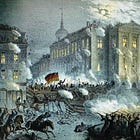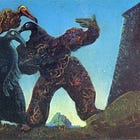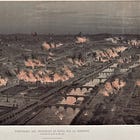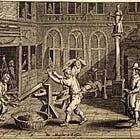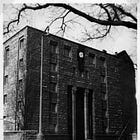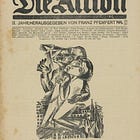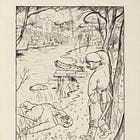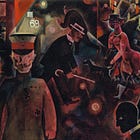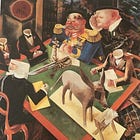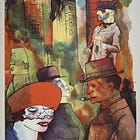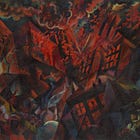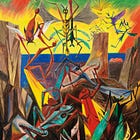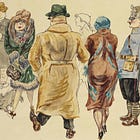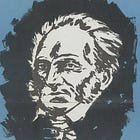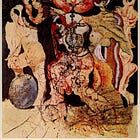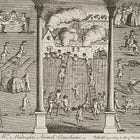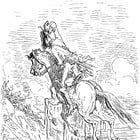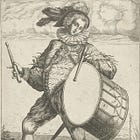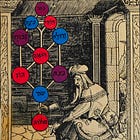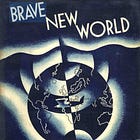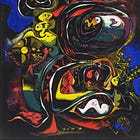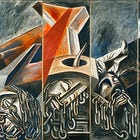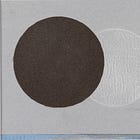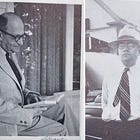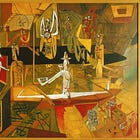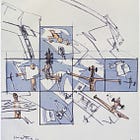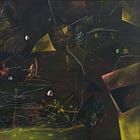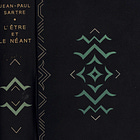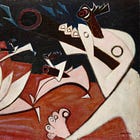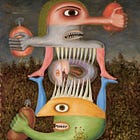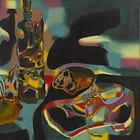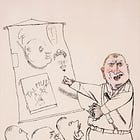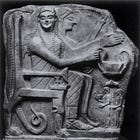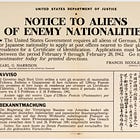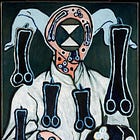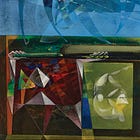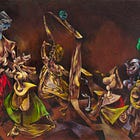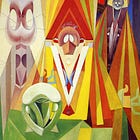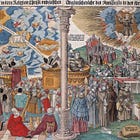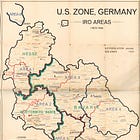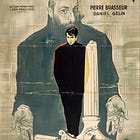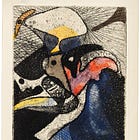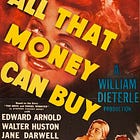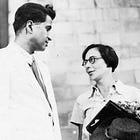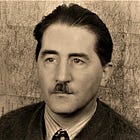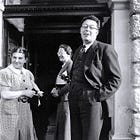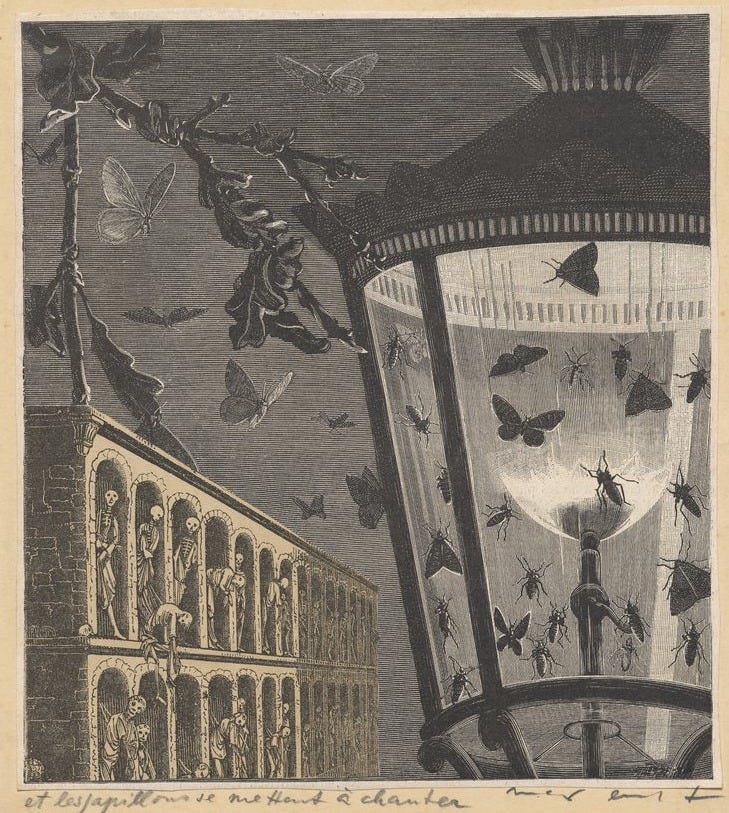
Navigating Substudies (8/1/25)
As promised: a provisional guide for navigating Substudies! As part of the broader project of the Critical Theory Working Group (CTWG), Substudies is a temporary platform (or “preliminary processing”) for sharing English-language translations and reconstructions of previously untranslated or unpublished—or otherwise largely inaccessible—materials from the archives of early critical theory (~1920-1950).
Because Substudies is a work-in-progress, every post here has been and will continue to be subject to revisions, additions, etc. according to the demands of ongoing research. Eventually, I hope that most of the material here finds a more permanent home through CTWG or elsewhere. Needless to say, I take full responsibility for any mistakes or mistranslations! I began translating because it seemed absolutely necessary for my own theoretical studies, and more than a few of the translations here will undoubtedly reflect my immaturity as a translator. However, I hope they also reflect a sincere and ongoing effort to get it right! In that spirit, if anyone has feedback on the translations here, I’d appreciate it greatly!
For new readers and subscribers, the best introduction to Substudies as a project is probably the following post:
Series on Substudies.
All of the posts on Substudies are roughly divided into several larger, overlapping, and open ‘series.’
Series: Essais Matérialistes—Foundations of Critical Theory (~1933-1939).
The first series I began on the blog uses Horkheimer’s (and Adorno’s) plans for an abandoned French publication of Horkheimer’s 1930s essays under the title Essais Matérialistes to frame Horkheimer’s (and Adorno’s, Marcuse’s) work on developing the critical-materialistic theoretical foundations of ‘critical theory’ in the 1930s:
Series: Dämmerung—Social Theory in Weimar Germany (~1920-1933).
The second series on the blog is dedicated to publishing materials from, for, or around Horkheimer’s often unread and often misread Dämmerung, published 1934 and written 1926-1931, a collection of ‘unswervingly’ communistic aphorisms written in the twilight of Weimar Germany:
I’ve also begun translating parts of Horkheimer’s lectures on the history of philosophy from the late 1920s, focusing on his presentation of the radical enlightenment tradition he considers the precursor to his own critical-scientific socialism:
Series: The ‘Dialectic,’ part I: from Philosophische Fragmente and “Society and Reason” (1944) to Dialektik der Aufklärung and Eclipse of Reason (1947).
The third series on Substudies is dedicated to materials from, for, or around Adorno and Horkheimer’s first (!) planned installment of their “dialectics” project of the late 1930s and early 1940s. Part of the work they generated during this period of their collaboration would eventually become Dialectic of Enlightenment (1947):
Horkheimer’s 1944 lectures on “Society and Reason” (hereafter: S&R), conceived as an ‘exoteric’ presentation of Dialectic of Enlightenment, would eventually be published under the title Eclipse of Reason (1947). I wrote an introduction to the project of S&R and Eclipse here, which is accompanied by transcriptions/translations of previously unpublished/untranslated materials from the composition/revision process:
Series: The ‘Dialectic,’ part II: The Rettung der Aufklärung (1944-1949).
The fourth series on Substudies is devoted to translations of and reconstructive work on the surviving fragments of Adorno and Horkheimer’s work from the mid-to-late 1940s on the unfinished second (!!) planned installment of their “dialectics” project:
Series: Germany-project, Studies in anti-Semitism, Studies in Prejudice (~1939-1950).
The last true series on the blog focuses on materials produced from, for, or around the Institute’s multi-phasic social research project of the 1940s, better known by the names ‘the Germany project’ (ca. 1939-1941), ‘Studies in Anti-Semitism’ (ca. 1939-1943), and ‘Studies in Prejudice’ (ca. 1944-1949).
The Germany-project (~1939-1941).
Studies in anti-Semitism (~1939-1943) and Studies in Prejudice (~1944-1952)
In connection with the Germany-project and the Studies in anti-Semitism/Prejudice, the ISR devoted considerable effort in the mid-to-late 1940s to drafting programs for post-war reconstruction and reflecting on the tasks of post-war critical theory.
Tasks of post-war Critical Theory (~1942-1950/51)
Research: Critical Theory in Collaboration.
Like all CTWG related projects, Substudies is free and always will be. If you want to help support the research, you can sign up for a paid subscription (5 bucks a month; 60 a year) here:
Take care and nil admirari,
—James/Crane (8/1/2025).
Announcement: Racketology Dossier (6/9/2025)
Check out the CTWG’s ongoing dossier on racket theory! Links here:
CTWG RACKET THEORY DOSSIER
Critics and theorists! Cross-posting this here because readers of ‘Substudies’ should be especially interested in the CTWG dossier on the ISR’s 1940s sketches on racket theory, or the return of direct forms of social domination under the impersonal rule of value in late capitalist society. With more to come this summer, our dossier thus far includes:
—James/Crane (6/24/2025)
Substudies is part of the ongoing project of the Critical Theory Working Group (CTWG) featuring translations, transcriptions, and research notes on the formation and development of ‘early critical theory’ (~1920-1950). The CTWG holds bi-annual open reading groups on texts and topics from early critical theory, which you can listen to for free through our Patreon. In December, 2024, we released the first issue of our journal, Margin Notes, now available as a free PDF on our website: Margin Notes: Volume 1, Kernels of Early Critical Theory. (Each of the articles has recently been converted into html. format for our blog: Margin-notes (articles).) For anyone interested, we are now open to blog submissions! Our most recent work has focused on a critical reconstruction of the ISR’s 1940s ‘Racket theory’ of class domination. We’ve published the first few installments of a dossier on Racketology to our website, and we have several more essays, fragments, and translations lined up for the next few weeks. —James/Crane (6/9/25)
Announcement: Substudies (1/9/2025)
Critics and theorists,
It’s been more than a year since I last posted here. In fall/winter 2023, the Critical Theory Working Group (CTWG for short) began in earnest. (We have a new website: https://ctwgwebsite.github.io/.) Since then we’ve held two sessions, both of which you can listen to recordings from for free through our Patreon page.1 The first session centered on on the theoretical foundations of ‘early critical theory’ as they were developed in the ISR’s Zeitschrift für Sozialforschung over the course of the 1930s (fall/winter 2023); the second on Adorno and Horkheimer’s Dialectic of Enlightenment (1947), beginning with problems in the reception history of the text (given its esoteric, Marxian core and the authors’ difficulty in finding any audience) and moving on to conceptual reconstruction of and critical reflections on the entire work, chapter by chapter (summer 2024). After nearly a year’s worth of writing, internal discussions, and editorial work, we released the first volume of the CTWG’s own journal, Margin Notes: Volume 1, Kernels of Early Critical Theory, which is available as a free PDF on our new site.2
I’m renaming this blog “Substudies: Materials and Notes on Critical Theory” and repurposing it for posting supplements to the collective efforts of the CTWG which, for whatever reason, are not or not yet a fit for the CTWG blog or forthcoming issues of the journal.
(I also plan to post translations and notes relevant to my dissertation research on Schelling’s Weltalter, the first within the next week. [See “Translation: "Report on Professor Schmid’s Pasigraphic Experiment in Dilligen," by F.W.J. Schelling (1811)”]
[For more notes on the history of philosophy, see: Guide to the Confucian Analects. Comparative History of World Philosophy Notes (I)]
Take care, and Nil admirari,
James/Crane — 1/9/2025
Full link: patreon.com/crittheoryworkgroup




